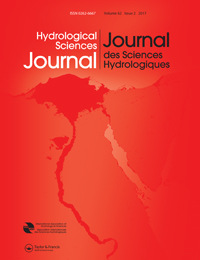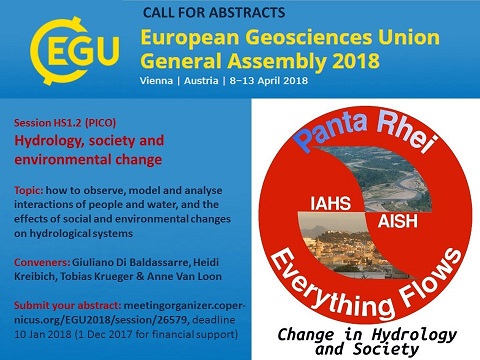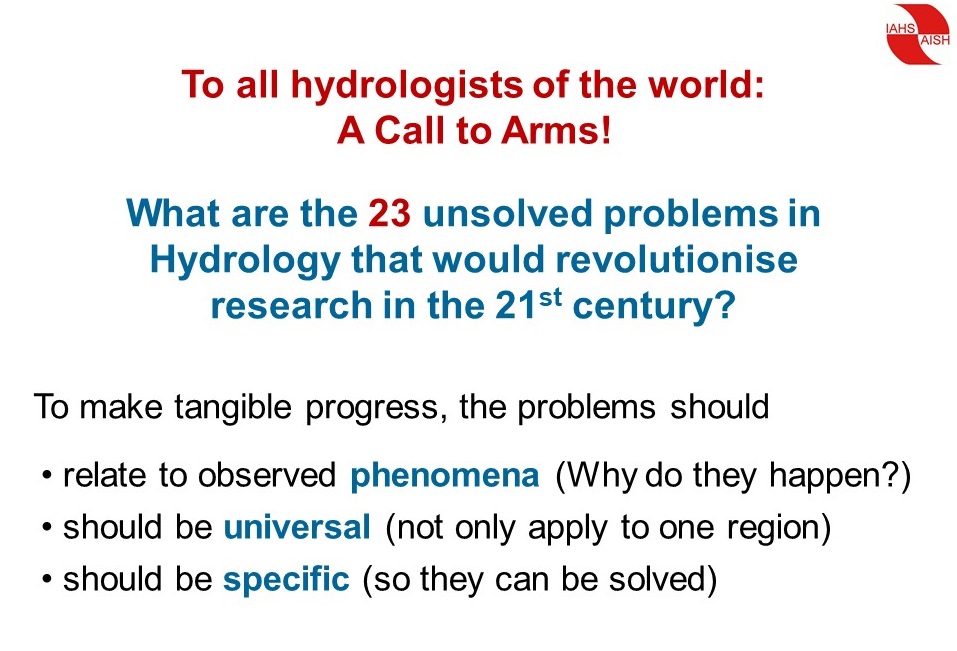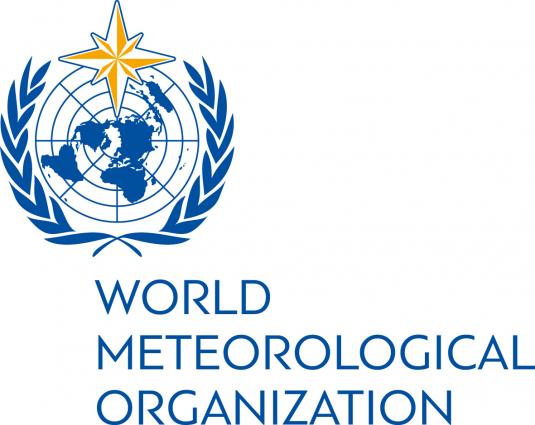IAHS News
Unsolved Problems in Hydrology - help to make a difference
In November 2017 IAHS launched the new initiative to generate the 23 unsolved problems in Hydrology that would revolutionise research in the 21st century with a YouTube video.
The generation of questions is open to everyone and will be distilled through discussion on the IAHS LinkedIn group https://www.linkedin.com/groups/13552921 We aim to finalise the questions in Spring 2018.
We already have entries over a wide range of topics with draft questions and comments. Recent contributions include:
How do droughts and floods shape hydrological risk awareness? By Panta Rhei Working group “Changes in flood risk”
How are changes in vulnerability influencing trends in flood risk? By Panta Rhei Working group “Changes in flood risk”
How to assess water scarcity by considering both water quantity and quality. By Panta Rhei Working group “Water Scarcity”
Do flood rich-poor periods exist? By Panta Rhei Working Group “Flood Change”
It is time to change our mind to augmenting groundwater recharge by focus on water-bearing formation in uplands watershed not just in flood plains or alluvial fans! By Mohammad Abassi
What controls the source of water to wells? By Kevin Bufus
Where and why is the largest global store of freshwater (groundwater) connected to other parts of the hydrologic cycle? By Tom Gleeson
When will hydrological models (HMs) be robust enough to anticipate accurately future water conditions? By Guillaume Thirel
What is the effect of preferential deposition and lateral redistribution of snow on runoff generation in alpine headwatersheds? By Ulrich Strasser
Assessing the impact of non-stationary (epistemic) precipitation errors on hydrological model predictions. By Keith Beven
There is still time to add your own draft question or add a comment to the existing discussion on the group so please join the conversation.
Subscription for Hydrological Sciences Journal for 2018
The annual subscription is now due for Volume 63 (2018) of Hydrological Sciences Journal. Volume 63 remains at 16 issues but we have managed to keep the annual subscription rate the same. Volume 63 will continue to publish a special series of invited opinion papers directly linked to the IAHS "Panta Rhei" initiative that will be collated in the online virtual special series. Discussions and replies on these opinion papers wll also be published.
 In July 2017 we announced the continued rise in Impact Factor for HSJ. The Impact Factor is 2.222 with a 5-Year Impact Factor of 2.372 (©2017 Thomson Reuters, 2016 Journal Citation Reports®).
In July 2017 we announced the continued rise in Impact Factor for HSJ. The Impact Factor is 2.222 with a 5-Year Impact Factor of 2.372 (©2017 Thomson Reuters, 2016 Journal Citation Reports®).
Following the retirement of Mike Acreman, Attilio Castellarin was confirmed as the Editor-in-Chief at the IAHS Scientific Assembly at Port Elizabeth, South Africa, with Demetris Koutsoyiannis the Outgoing Editor-in-Chief and Ross Woods as the most recent Editor and a new Editor will be appointed in due course. The number of Associate Editors has risen to 41.
Special journal subscription rates are available to IAHS Members: £27.00 for a personal online subscription, and £48.00 for a personal online + print subscription (£32.40 and £53.40, respectively for EU members, inclusive of VAT).
You can renew your membership online via the IAHS website at https://iahs.info/Members-Area/hsj-link.do or contact the IAHS office via phone +44 1491 692515, fax +44 1491 692448 or email info@iahs.co.uk.
IAHS Membership
Abstract submission deadline for EGU2018 sessions
The abstract submission deadline for EGU2018 sessions is 10th January 2018. The following sessions are especially related to Panta Rhei.

HS1.2 Hydrology, society and environmental change (PICO session)
Conveners: Giuliano Di Baldassarre, Heidi Kreibich, Tobias Krueger, Anne Van Loon
HS2.1.1 Hydrological extremes: from droughts to floods
Conveners: Anne Van Loon, Jan Szolgay, Lena M. Tallaksen, Gregor Laaha
HS5.3 Advances in socio-hydrology
Conveners: Marcus Nüsser, Murugesu Sivapalan, Britta Höllermann, Giuliano Di Baldassarre, Alberto Viglione, Saket Pande
HS5.15/NH1.15 Agent-Based Modelling in hydrology – integrative solutions to the Food Water Energy nexus (co-organized)
Conveners: Ted Veldkamp, Jeroen Aerts, Giuliano Di Baldassarre, Niko Wanders
HS7.4 Naturally trendy: natural (and non-natural) trends (and non-trends) in climate and hydrology
Conveners: Serena Ceola, Demetris Koutsoyiannis, Alberto Montanari, C. Cudennec, Harry Lins
NH9.13/HS11.45/SSS13.67 Including Socio-Economic Dynamics and Feedbacks in Risk Assessment Models (co-organized)
Conveners: Jeroen Aerts, Giuliano Di Baldassarre, Sven Fuchs, S. Surminski
HS2.4.3/NH1.25 River flood dynamics and risk: processes, controls, consequences (co-organized)
Conveners: Sergiy Vorogushyn, William Farmer, Heidi Kreibich, Luis Mediero, Alberto Viglione
HS5.7/ERE3.8 Advances in modeling and control of environmental systems: from drainage and irrigation to hybrid energy generation. (co-organized)
Conveners: Alla Kolechkina, Matteo Giuliani , Jonathan Herman , Andreas Efstratiadis , Mashor Housh , Eric Duviella
HS5.1 Hydrology & Society: Transdisciplinary approaches to hydrology and water resources management PICO session
Conveners: Leon Herman, Britta Höllermann , Thomas Thaler , Gemma Carr , Eric Lindquist
Panta Rhei Survey
This is a reminder about the ongoing Panta Rhei Survey.
You can help us identify hotspots of water crises around the world by filling in the attached questionnaire before January 8. It takes only 5-10 minutes!
This Panta Rhei Survey is a step towards a community-wide effort to share data and advance our understanding of social, technical and hydrological factors underlying the emergence of different phenomena.
If you know of any water crisis, please fill in the questionnaire (see attachment) and send it back by email to giuliano.dibaldassarre@geo.uu.se by January 8. All contributions will be properly acknowledged.
Best wishes,
Giuliano Di Baldassarre
IAHS Panta Rhei Chair 2017-2019
On behalf of the IAHS Panta Rhei Leadership Team (Veena Srinivasan, Fuqiang Tian, Yasir Mohamed, Tobias Krueger, Heidi Kreibich, Junguo Liu, Tara J. Troy & Amir AghaKouchak)
Unsolved Problems in Hydrology - Join the Conversation
The generation of questions is open to everyone and will be distilled through discussion on the IAHS LinkedIn group https://www.linkedin.com/groups/13552921 We aim to finalise the questions in Spring 2018.
We already have entries over a wide range of topics with draft questions and comments including:
Can we trade space for time in hydrology? By Ross Woods
How can we identify the independent factors determining a nonlinearly evolving hydrologic response? By Elena Volpi on behalf of ICSH – STAHY Commission
How can one identify the optimal sample dimension to use in multivariate analysis with copula functions? By Elena Volpi on behalf of ICSH – STAHY Commission
How can we detect and attribute change in flood characteristics? By Elena Volpi on behalf of ICSH - STAHY Commission
Sudden and abrupt changes of water management conditions? By Andreas Schumann
Natural heterogeneity, thermodynamics and (yet again) closing the water balance, by Markus Hrachowitz
Why do we see long term cycles in temperature, rainfall and river flows? By Alberto Montanari
Is it possible to remove the independence condition in the multivariate frequency analysis (e.g., when using Copulas)? By Salvatore Grimaldi
Closing the mass-age balance by measurement by Wouter Berghuijs
What controls the long term water balance, apart from aridity? By Ross Woods
How to determine the snow water equivalent in mountain regions? By Simon Gascoin
What is the value of soil moisture observations for hydrologic predictions? By Luca Brocca
Feel free to add your own draft question or add a comment to the existing discussion on the group.
Panta Rhei Survey: Water Crises?
Dear Colleague,
Do you know of any Water Crisis?
Help us identify hotspots around the world by filling in the attached questionnaire!
(It takes only 5-10 minutes)
This Panta Rhei Survey is a step towards a community-wide effort to share data and advance our understanding of social, technical and hydrological factors underlying the emergence of different phenomena.
If you are at the AGU Conference, please pass by our Interactive Poster on Thursday Morning. We can have a chat, and you can take part to our Survey directly there!
H41E-1490 Panta Rhei-Everything flows: Global Hotspots of Human-Water Interactions Thursday 14 December 2017, 08:00 – 12:20, Poster Hall D-F
At the AGU Conference, we will also discuss human-water interactions during the two oral sessions in the afternoon:
H43R Hydrology, Society, and Environmental Change: Coupled Human-Water Dynamics Across Scales I Thursday, 14 December 2017, 13:40 - 15:40, Room 280-282
H44F Hydrology, Society, and Environmental Change: Coupled Human-Water Dynamics Across Scales II Thursday, 14 December 2017, 16:00 - 18:00, Room 280-282
If you are not at the AGU Conference, please fill in the questionnaire (see attachment) and send it back by email to giuliano.dibaldassarre@geo.uu.se. All contributions will be properly acknowledged.
All the best,
Giuliano Di Baldassarre
IAHS Panta Rhei Chair 2017-2019
On behalf of the IAHS Panta Rhei Leadership Team:
Veena Srinivasan, Fuqiang Tian, Yasir Mohamed, Tobias Krueger, Heidi Kreibich, Junguo Liu, Tara J. Troy, and Amir AghaKouchak
Upcoming conference sessions related to Panta Rhei
We would like to draw your attention to the upcoming Panta Rhei related sessions at AGU 2017 (New Orleans, USA, 11-15 December 2017)
Session on Hydrology, Society, and Environmental Change: Coupled Human-Water Dynamics Across Scales (Conveners: Hilary McMillan, Giuliano Di Baldassarre and Muregusu Sivapalan)
Thursday, 14 December 2017 08:00 - 12:20 New Orleans Ernest N. Morial Convention Center Poster Hall D-F (H41E)
Thursday, 14 December 2017 13:40 - 18:00 New Orleans Ernest N. Morial Convention Center 280-282 (H43R, H44F)
Other related sessions in New Orleans, include:
Global Floods: Forecasting, Monitoring, Risk Assessment, and Socioeconomic Response (H12C, H13O, H21D)
Water and Society: Modeling Food-Energy-Water Nexus for Sustainable Resource Management (H23J, H21S)
Water and Society: Water Resources Management and Policy in a Changing World (H31O, H33H, H32G)
Also, the Panta Rhei session information is now available for EGU 2018 (Vienna, Austria, 8-13 April 2018). Please consider submitting to these sessions!
Support application deadline is 1 December 2017 and abstract submission by 10 January 2018.
HS1.2 Hydrology, society and environmental change (PICO session)
Conveners: Giuliano Di Baldassarre, Heidi Kreibich, Tobias Krueger, Anne Van Loon
HS2.1.1 Hydrological extremes: from droughts to floods
Conveners: Anne Van Loon, Jan Szolgay, Lena M. Tallaksen, Gregor Laaha
HS5.3 Advances in socio-hydrology
Conveners: Marcus Nüsser, Murugesu Sivapalan, Britta Höllermann, Giuliano Di Baldassarre, Alberto Viglione, Saket Pande
HS5.15/NH1.15 Agent-Based Modelling in hydrology – integrative solutions to the Food Water Energy nexus (co-organized)
Conveners: Ted Veldkamp, Jeroen Aerts, Giuliano Di Baldassarre, Niko Wanders
HS7.4 Naturally trendy: natural (and non-natural) trends (and non-trends) in climate and hydrology
Conveners: Serena Ceola, Demetris Koutsoyiannis, Alberto Montanari, C. Cudennec, Harry Lins
NH9.13/HS11.45/SSS13.67 Including Socio-Economic Dynamics and Feedbacks in Risk Assessment Models (co-organized)
Conveners: Jeroen Aerts, Giuliano Di Baldassarre, Sven Fuchs, S. Surminski
HS2.4.3/NH1.25 River flood dynamics and risk: processes, controls, consequences (co-organized)
Conveners: Sergiy Vorogushyn, William Farmer, Heidi Kreibich, Luis Mediero, Alberto Viglione
HS5.7/ERE3.8 Advances in modeling and control of environmental systems: from drainage and irrigation to hybrid energy generation. (co-organized)
Conveners: Alla Kolechkina, Matteo Giuliani , Jonathan Herman , Andreas Efstratiadis , Mashor Housh , Eric Duviella
HS5.1 Hydrology & Society: Transdisciplinary approaches to hydrology and water resources management PICO session
Conveners: Leon Herman, Britta Höllermann , Thomas Thaler , Gemma Carr , Eric Lindquist
To all hydrologists of the world: A Call to Arms!
What are the 23 unsolved problems in Hydrology that would revolutionise research in the 21st century?
At the IAHS Scientific Assembly in Port Elizabeth in July 2017 the new President of IAHS, Günter Blöschl, outlined his vision for a new initiative to generate a list of unsolved problems in hydrology.

Progress in hydrology is currently hampered by the rather fragmented research and we need stronger harmonisation of research efforts. At the beginning of the 20th Century, mathematician David Hilbert set out 23 unsolved mathematical problems which have greatly stimulated focused research in mathematics and we can use this as a model for the IAHS initiative.
IAHS will facilitate the compilation of a list of unsolved scientific problems in hydrology to revolutionise research in the 21st Century and raise the level of excitement for the science. To make tangible progress, the problems should
(1) ideally relate to observed phenomena and why they happen;
(2) they should be universal (i.e. not only apply to one catchment or region); and
(3) they should be specific (so there is hope they can be solved).
The video outlining the new IAHS initiative is available on the IAHS YouTube channel.
Discussion is encouraged via the LinkedIn Group IAHS – International Association of Hydrological Sciences. All IAHS members are invited to join, and so are all sister associations and partners, and all hydrologists. The IAHS Commissions and Working Groups are tasked with streamlining the discussion and coming up with 3 unsolved problems each.
During Winter 2017/2018 we will discuss the procedures for selecting the most important problems and come up with a short list of problems. In April 2018, we will meet to make a final selection based on the discussion outcomes. That meeting is open to all hydrologists.
Once established, the list will be used within IAHS to align symposia planning and other events. It can of course also be used by everybody in hydrology for supporting project proposals and more generally conducting focused research. The vision is for the list of unsolved problems in hydrology to better link hydrological research around the world, and to make more tangible, coherent progress in hydrology.
One week remaining to submit an abstract for the MOXXI - WMO HydroHub Joint Meeting
The deadline to submit an abstract to the MOXXI - WMO HydroHub Joint Meeting 2017 "Innovation in Hydrometry - From Ideas to Operation" is only one week away!
If you have not done it yet, please send your abstracts to me or register to the meeting by emailing me with your affiliation details.
Further details on the meeting can be found at this page.
Kind Regards,
Flavia
Dr. Flavia Tauro
Email: flavia.tauro@unitus.it
Chair, MOXXI, International Association of Hydrological Sciences


Abstract submission for 'Innovation in Hydrometry - From Ideas to Operation'
There are less than two weeks left to submit your abstract to "Innovation in Hydrometry - From Ideas to Operation - MOXXI and WMO HydroHub Joint Meeting"!
The meeting will be held in Geneva on December 4th and 5th.
Please see the dedicated page for details.
If you would like to participate as an observer, please send an email to me with your affiliation details.
Feel free to forward this to friends and colleagues.
See you soon!
Flavia
Dr. Flavia Tauro
Email: flavia.tauro@unitus.it
Chair, MOXXI, International Association of Hydrological Sciences


